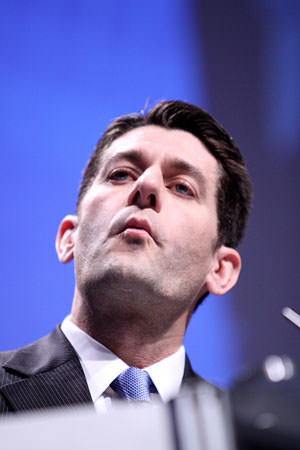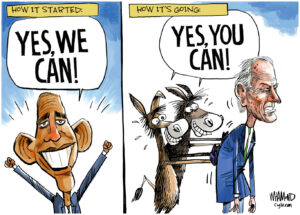The Right’s War on Moderation
However the shutdown saga ends, the negotiating styles of the two sides ought to tell moderates that they can no longer pretend that the two ends of our politics are equally "extreme."
Political moderates and on-the-fencers have had it easy up to now on budget issues. They could condemn “both sides,” and insist on the need for “courage” in tackling the deficit.
Thanks to Rep. Paul Ryan’s budget and the Republicans’ maximalist stance in negotiations to avert a government shutdown, the days of straddling are over.
Ryan’s truly outrageous proposal, built on heaping sacrifice onto the poor, slashing scholarship aid to college students and bestowing benefits on the rich, ought to force middle-of-the-roaders to take sides. No one who is even remotely moderate can possibly support what Ryan has in mind.
And please, let’s dispense with the idea that Ryan is courageous in offering his design. There is nothing courageous about asking for givebacks from the least advantaged and least powerful in our society. It takes no guts to demand a lot from groups that have little to give, and tend to vote against your party anyway.
And there is nothing daring about a conservative Republican delivering yet more benefits to the wealthiest people in our society, the sort who privately finance the big ad campaigns to elect conservatives to Congress.
Ryan gives the game away by including the repeal of financial reform in his “budget” plan. What does this have to do with fiscal balance? Welcome to the Wall Street Protection Act of 2011.
Oh, yes, and this budget has nothing to do with deficit reduction. Ryan would hack away at expenditures for the poor. The Center on Budget and Policy Priorities estimates he gets about two-thirds of his $4.3 trillion in actual cuts from programs for low-income Americans. Note that this $4.3 trillion almost exactly matches the $4.2 trillion he proposes in tax cuts over a decade. Welcome to the Bah Humbug Act of 2011.
But you’d expect a progressive to feel this way. What’s striking is that Ryan is pushing moderates to stand up for a government that will have enough money to perform the functions now seen as basic in the 21st century. These notably include helping those who can’t afford health insurance to get decent medical care, a goal Ryan would have the government abandon, slowly but surely.
Erskine Bowles and Alan Simpson, the co-chairs of the deficit commission and the heroes of the budget-cutting center, put out a statement saying some nice things about the idea of the Ryan budget. They called it “serious, honest, straightforward,” even though there is much about its accounting that is none of those.
But then they got to the real point, declaring themselves “concerned that it falls short of the balanced, comprehensive approach” needed for bipartisan accord because it “largely exempts defense spending from reductions and would not apply any of the savings from eliminating or reducing tax expenditures as part of tax reform to deficit reduction.”
Ryan, they argued, “relies on much larger reductions in domestic discretionary spending than does the commission proposal, while also calling for savings in some safety net programs — cuts which would place a disproportionately adverse effect on certain disadvantaged populations.”
This is much like what I said, with an added layer of diplomacy. When even deficit hawks begin choking, however politely, on a proposal whose main motivation is ideological, you know there is an opening for a coalition between moderates and progressives on behalf of sane, decent government.
The Republican approach to shutdown talks should reinforce this possibility. Democrats have nearly given away the store to avoid a crackup, yet Republican leaders, under pressure from their right wing, have continued to ask for more and more and more. My word, even President Obama has finally gotten impatient.
However the shutdown saga ends, the negotiating styles of the two sides ought to tell moderates that they can no longer pretend that the two ends of our politics are equally “extreme.” No, conservatives are the ones who’ve been radicalized. The Ryan budget is definitive evidence of this.
It is conservatives who would transform our government from a very modestly compassionate instrument into a machine dedicated to expanding existing privileges while doing as little as possible for the marginalized and the aspiring — those who, with a little help from government, might find it a bit easier to reach for better lives.
Moderation involves a balance between government and the private sector, between risk and security, between our respect for incentives and our desire for greater fairness. The war against moderation has begun. Will moderates join the battle?
E.J. Dionne’s e-mail address is ejdionne(at)washpost.com.
© 2011, Washington Post Writers Group
Your support is crucial…With an uncertain future and a new administration casting doubt on press freedoms, the danger is clear: The truth is at risk.
Now is the time to give. Your tax-deductible support allows us to dig deeper, delivering fearless investigative reporting and analysis that exposes what’s really happening — without compromise.
Stand with our courageous journalists. Donate today to protect a free press, uphold democracy and unearth untold stories.









You need to be a supporter to comment.
There are currently no responses to this article.
Be the first to respond.